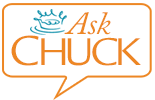Ask Chuck: 8 Budget Hacks to Save Over $3,600
To learn Biblical answers to your financial questions, you can #AskChuck @AskCrown your questions by clickinghere. Questions used may be lightly edited for length or clarity.
Dear Chuck,
I've seen that you really encourage people to save $1,000 that they don't touch at all except for extreme emergencies, but seriously, I CAN'T DO IT! I need some advice on where to cut because I'm so close to the edge. Got any ideas?
Open to Suggestion

Dear Open,
Trust me, you are not the first person to feel that way or ask that question!
Most of us are so busy that we don't feel we have the time to stop and evaluate our spending. The first thing you need to do is be sure that you have a functional budget. You may be surprised to see just where your money goes when you work through a plan. Crown has some wonderful free tools to help you with that, but let's assume that you have a good budget in place, and you are still stuck. I have some "Budget-Hacks" to help you redirect money from things that most of us have hidden in our spending.
Think of it as the application of Ben Franklin's wisdom, "A penny saved is a penny earned." So let's count some pennies we can save, because pennies add up to dollars.
Bring your Coffee. The average worker spends $20 a week buying coffee, adding up to more than $1,090. If you even brought coffee from home half the time, you just saved $500.
+Add $500 to your emergency fund.
Make a Grocery List. Americans throw away about $165 billion in wasted food, which comes to about $529 per person. It adds up if you have a family. By planning your meals better, you can save money every month, but let's assume you only make a slight changes to shop more carefully, you still can conservatively save $500 per year for a family.
+Add $500 to your emergency fund.
Play more at home. Estimates about how much people spend on entertainment varies, but a recent report looked at the budget of a family making about $50,000/year, and found that they spent about $2,605 on some kind of entertainment. That comes to about $200 a month, about $50 a week. If you cut out just one outside entertainment a month (a trip to the movies perhaps), you could save approximately $600.
+Add $600 to your emergency fund.
Pack a lunch rather than buy out. The average worker pays about $37 a week buying lunch out, more than $1,900 a year. Double that if you are married. If you skip just one week of eating out each month while at work, you can save $444.
+ Add $444 to your emergency fund.
Take up running or walking and skip the gym membership (if you're not using it.) Did you know that 67% of us waste about $468 a year by NOT using the gym memberships we have paid for? I'm all for exercise, and if you're using the membership, that is fantastic. But if not, consider whether a gym membership is a good use of money.
Get a great pair of running shoes and consider dropping the gym fees.
+ Add $400 to your emergency fund.
Put Fido on a budget. Americans spend a fortune on their pets, and while there are certain costs that are fixed, billions of dollars every year go to buy gifts for our furry friends. In fact, 65% of Americans have a pet and spend an average of $1,600 on a dog each year. Dog clothes, animal toys, and even pet parties are becoming part of American life. Remember that a pet really wants your attention and not your cash, so buy fewer toys and take more walks.
Cut your pet budget by at least 10%.
+Add $160 to your emergency fund.
Turn Trash into Treasure. Arranging garage sales of things you don't want (or a sale through eBay, Craigslist or another shopping tool) is a great way to turn one man's trash into cash. Consumer Reports indicates that each week, garage sales generate about $4.2 million in profit. Done correctly, the average garage sale can net $500 to $700. Who knows what money you might have laying in your home?
Organize a garage sale and add at least half of your profits to the emergency fund.
+ Add $250 to your emergency fund.
Turn Taxes Into Savings. In 2015, the average tax refund was $3,120 — a tidy sum. I've written a lot about how to manage that, including recommending to check your withholding because you may be deducting too much each month. But with January approaching, consider whether you already have saved $1,000 with Uncle Sam's help.
Change your tax withholding to avoid the refund.
+Add $1,000 of your tax refund straight into the emergency fund or change your withholding amount and put $250/month into the fund.
I hope you see that by making just a few changes, rather than a drastic lifestyle overhaul, you can accumulate the needed $1,000. Of course, once you make the switch, be sure that the cash goes into your emergency fund! Just the few things listed above could lead to more than $3,600 and counting! Be sure to take advantage of direct deposit options at your work, free apps on your phone to track spending, and the tried and true system of carrying cash in envelopes to be sure you never overspend your budget.
And don't forget the importance of becoming debt-free, try the debt-snowball method to pay off your debt faster or contact a debt counselor to help you eliminate your credit card debt faster.
The fact that it may take some time to build up your fund is to be expected. The Bible advocates saving a little amount over a long period of time.
Proverbs 13:11 notes, "Dishonest money dwindles away, but he who gathers money little by little makes it grow."
To #Ask Chuck @AskCrown your own question, click here:





















